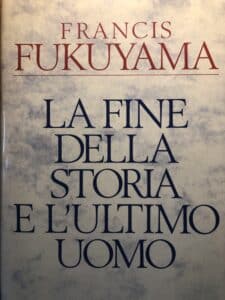I remember the climate of 1992, end of SSSR in 1989, Western triumph, American hegemony not discussed, peace dividend, stop to weapon and so on. As for an instant book, Francis Fukuyama at age of 40, wrote a nice academic book with a fascinating title “The end of history and the last man”, suddenly becoming a best seller book. It’s very nice to open it today after thirty years and in this war climate in Europe, here from the Baltic perspective, the most aggressive in EU. It’s a book which we could call Wilsonian, remembering Wilson’s vision of peace in Paris 1918, trying to depict a scenario where all the countries will become democratic, peacefully cooperative, refusing war as a political action, power as an objective, realising a world union, in an American way of life as a framework.Of course he is not ignoring classical geopolitics, realistic approach, which was clearly depicted by Kissinger for USA in the previous twenty years from Nixon on, and admits the success of realpolitik approach to China and Vietnam war, to Middle-East balancing of powers, but he considers this vision as a step of a possible slow but sure progress toward a democratic world. Of course today Fukuyama seems to be beaten by Kissinger vision 5 to 0, considering what happened in Europe from 2014 on. By the way he was an expert of Russia and East European countries ex SSSR, and was writing after the Czechs and Slovaks separation and at the beginning of Jugoslavia horrible war. Reading now the few pages dedicated to Eastern nations and their possible conflicts internal and external, it’s emerging an Utopic peaceful vision, where the big of Europe will overcome every local conflict, without engaging again in a general war. Good forecast for Jugoslavia dis-integration, but completely wrong hypothesis in the Ucraine war case.
Notwithstanding these failures of Fukuyama forecasting after thirty years, I cannot criticise too much its book, because its basic model is: everything is evolving, cultures, behaviours, men and women minds attitudes. Why only history must remain always the same ripetitive game of power and violence? Has history a direction of evolution? These are fundamental questions for an universal history of humankind, which remain absolutely opened also today. Probably classical geopolitics approach can help us to read better the short term facts, to negotiate possible balancing of powers in their running, to forecast new emerging nations policies, with their interests as political focus in Africa and Asia. But the hope of all human beings in a future of peace, democratic freedom and stability also cannot be forgot. Probably in those euphoric times of SSSR dis-integration after 70 years of European terrors, the hope was overcoming the reality in the Fukuyama vision. but the basic questions of its book remain untouched for the long term international relationships. So the 5-0 result in Kissinger-Fukuyama game is not completely fair. Today Kissinger realistic approach is winning and a return to peace in Europe must remember his Westphalian peace model of balancing powers. But in the long term the acceptance of violence, national interests pursuing with wars, new nationalistic cycle for new nations, must find some more common accepted regulations to deal with local conflicts, probably increasing as the number of nations increase, from a multipolar leadership involving the major powers, not from the hegemony of USA as in 1992 we all were thinking. The deep discontinuity of forecasted model in the last ten years especially in Europe must be overcome probably in at least another ten years period, to talk again about a long term vision of peaceful collaboration among the major powers, with benefits for all the small ones.

